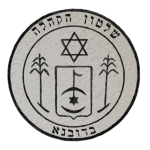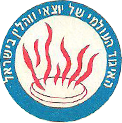Nobody’s Child
Tsippy Gon-Gross
Young Couple
“Close your eyes,” says the facilitator of the workshop for therapists. “Relax your body, let yourself focus on the most important part of it.” I lie on the mattress, change my position again and again. I recall that it was just like this, in exactly this fetal position that my mother wanted to pass the long days in the nursing home. I wander along the parts of my body from the inside, avoiding my head, touching my veins, my arteries, scanning the chambers of my heart. Drawn like a magnet to the folds of my belly. The womb, there’s no escaping it. For me, the womb is the center of my body. The womb as the center of gravity, the womb as the center of equilibrium, the womb as the part that enables me to fly, the womb as wings. My mother used to say, Rachmanut (which means ‘pity’ and comes from the same root as rechem, womb) when she wanted to express compassion, helplessness, even love. My mother and I have the womb in common, the day I first got my period, the womb in common, when I take her to my gynecologist and leave the room when it’s time for the examination. “I thought I wouldn’t be able to have children,” she tells me about the months of hiding. “I didn’t get my period.” “My teeth fell out too,” she adds, to stop me from blushing, and I didn’t dare ask if they slept together.
A young couple, the day after their wedding, trapped in forced intimacy with other people, urinating and defecating in a shared chamber pot that alternated as a repository for potato peels and leftover pieces of bread. The heel of a bread is called a nishika, which also means ‘kiss’. When I was a child, Nishikat ha Shoah, the Holocaust Kiss, is what I called the crust of bread my mother and father passed from mouth to mouth for days then, the way a mother bird feeds its tiny fledglings from her beak. They saved the leftover pieces in their faded clothes so they wouldn’t dry out, saved crumbs for the day Luba Caspar would tell them they could leave.
Did they kiss in the pit? Did they touch each other in that stench? During the shivah, Grishka brought me a picture I had never seen before. Right after the war, Mama and Papa are standing on a staircase in a city that has been destroyed. Both are very thin, dressed in black, my mother’s bulging stomach proof of new life. Every time I browse through the album I put together after she died, I am drawn to the renascent womb. “I wanted to have an abortion,” she tells me in a moment of closeness in Prague, “but Dr. Greenzweig, you know, a Jew from Dobna, wouldn’t do it.” “Too many Jewish babies died, I won’t kill another one,” he said, and so he saved my brother. At night, I dream that Mama is lying in the hospital, almost completely covered up, her hair black, very serene. Papa is sitting on a chair beside her bed, looking just the way he does in the tiny picture hanging on the tree of photos in her living room. Tall, full, young, silent. A turquoise plastic strip is tied around my mother’s ankle, and I have to cut it off when the time comes. An identification strip, like the plastic bracelets they put on babies when they’re born, an infusion tube, a life line, an umbilical cord. Only the scissors in my hand will signal the end. Do I cut it?
I don’t want to stop writing about Mama, don’t want to part from her. I have to knead the memories over and over again, but the smell of mourning, of the sack and the torn black cloth fills my nostrils. I have to knead that bread over and over again so it won’t dry up, repeating out loud Mama’s sardonic remark so it won’t lose its intonation. “What are you talking about?” she asked Shlomit, who promised Mama she’d come regularly to water the plants until grandma came back home. “What are you talking about?” I say to myself with her last ounce of strength, comparing the exactness of the sounds. “I’m not coming home. The plants will be yours.”
Years ago, when I took her home from a doctor’s
appointment, she emerged from her armor for a minute and
dared to ask for something. “Just promise me I won’t have to
leave the house. That I’ll stay here.”
“I want to die in my own bed,” wrote Yehuda Amichai, the
poet, but he died in torment in a bed in Jerusalem’s Hadassah
Hospital, tubes running in and out of his body.

